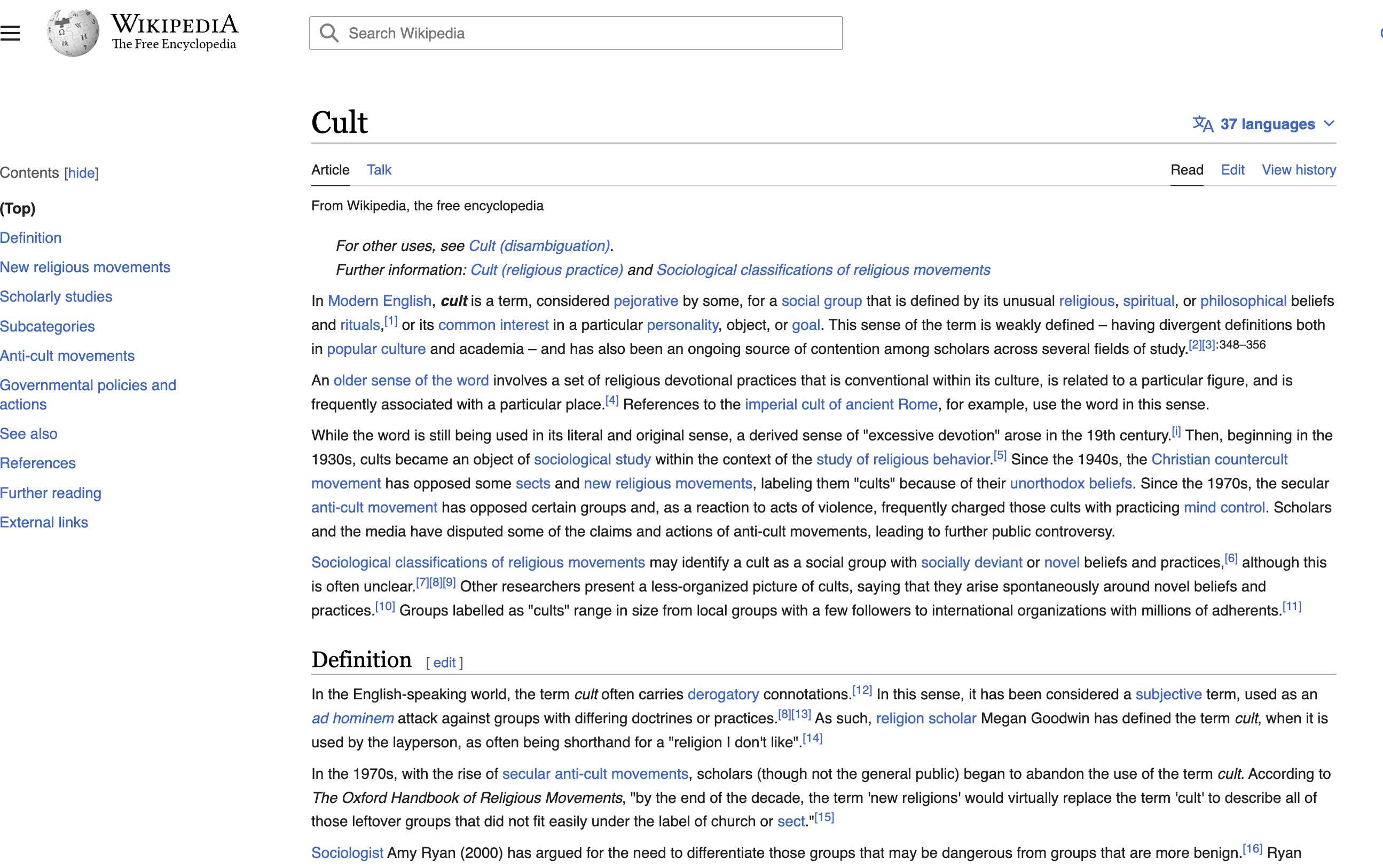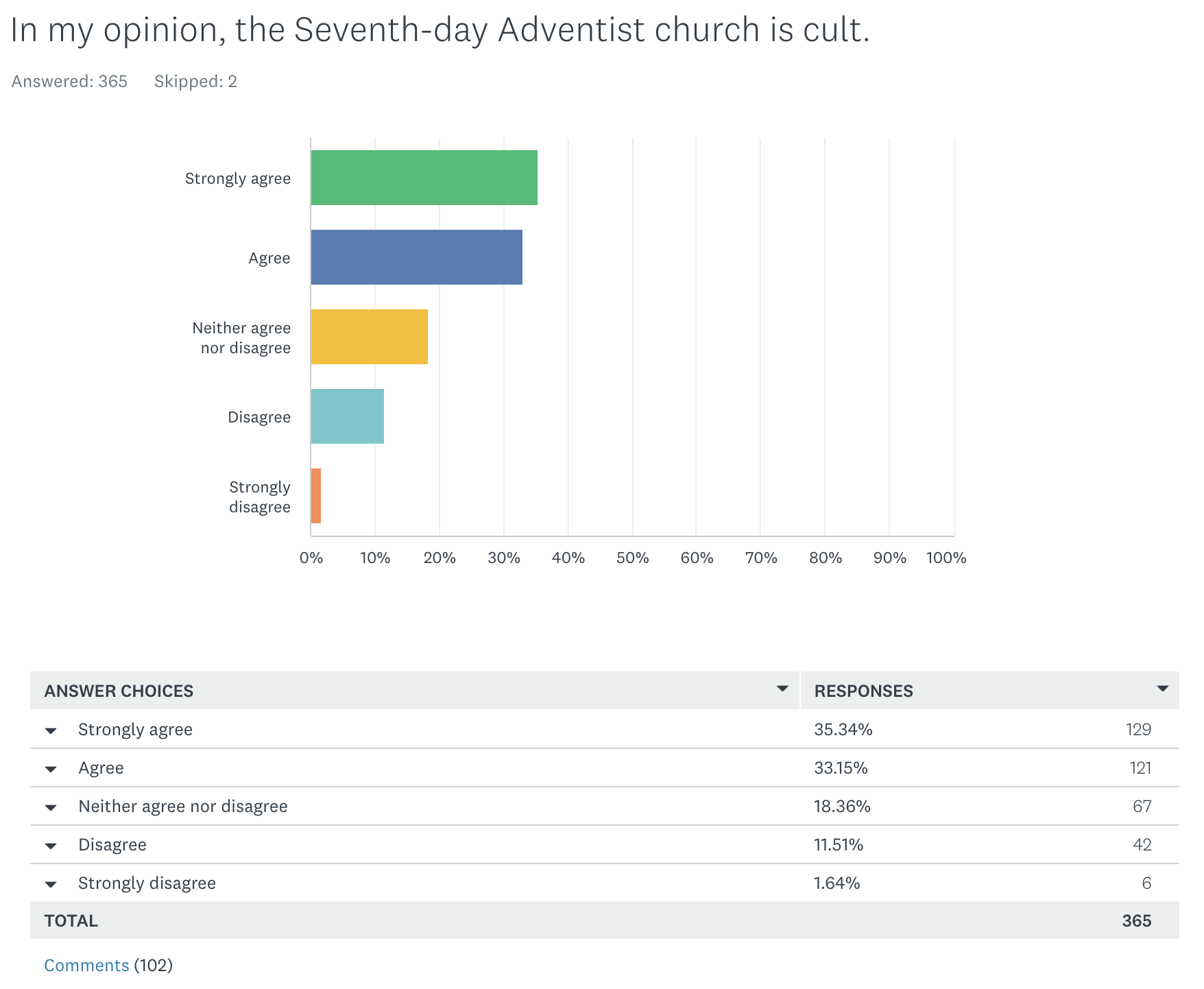“The SDA cult needs to be comprehensively exposed to as wide an audience of SDAs and non-SDAs as possible, and then be roundly and formally denounced by as many people and institutions as possible. E.G. White was likely a psychopathic con artist who may someday be viewed as one of the most impacting con artists in recorded history.”
-male Millennial survey respondent
The cult question
Strong words of accusation
Reading through the comments has been difficult and fascinating. As a sociologist I find most of the comments inherently interesting, of course, but reading some offerings has been difficult knowing that a real person spent time thinking about and writing those words. This comment from a Millennial male from the United States was particularly striking in its passion and deep conviction.
In response to Q27 “In as few or as many words as you like, please tell us about your process and experience of leaving Adventism.” he wrote,
“The SDA cult had a strong and lasting negative impact on me for many years after I internally denounced the faith. It has taken me decades to develop a deepened awareness of just how systematically diabolical this cult system is, how damaging it has been to me throughout my entire childhood and adult life, and how dangerous it is to the survival of the human race for Adventism to be allowed to continue to freely prey upon on its victims in the manner that it does. Adventism and the SDA educational system is, by design, a methodical, strategic brainwashing camp that actively employs shame-based cognitive, behavioral, and emotional mind-control techniques within its milieu in order to deeply indoctrinate its followers and their current and future offspring. This is particularly damaging to Adventist children and should meet the minimum legal threshold necessary to define some SDA practices as inherently abusive towards children, and yet it is somehow not defined or viewed that way socially or legally. The SDA cult needs to be comprehensively exposed to as wide an audience of SDAs and non-SDAs as possible, and then be roundly and formally denounced by as many people and institutions as possible. E.G. White was likely a psychopathic con artist who may someday be viewed as one of the most impacting con artists in recorded history. The harm that Adventism has caused and continues to cause globally is being vastly underrepresented and undervalued, and warrants significant further research and social, political, legal, ethical, psychological, and theological scrutiny.”
techniques within its milieu in order to deeply indoctrinate its followers and their current and future offspring. This is particularly damaging to Adventist children and should meet the minimum legal threshold necessary to define some SDA practices as inherently abusive towards children, and yet it is somehow not defined or viewed that way socially or legally. The SDA cult needs to be comprehensively exposed to as wide an audience of SDAs and non-SDAs as possible, and then be roundly and formally denounced by as many people and institutions as possible. E.G. White was likely a psychopathic con artist who may someday be viewed as one of the most impacting con artists in recorded history. The harm that Adventism has caused and continues to cause globally is being vastly underrepresented and undervalued, and warrants significant further research and social, political, legal, ethical, psychological, and theological scrutiny.”
A cult?
This respondent is not alone in referring to Adventism as a cult. As you can see from the the data below most- more than two thirds- of our respondents agree with this assessment.

“Cult-ish”
The binary of is or is not a cult is clearly not nuanced enough for many. One respondent viewed the word ‘cult’ as a smear.
“Every time I’ve heard the word cult used to describe a group, it’s been a smear attempt, so I don’t know how helpful the term is. The SDA church certainly can be a high control group, but the experience of such is so depended on where/when you interacted with it and who you were that it’s hard to give a global label like ‘cult.'”
But how do you define a cult? These next three comments dance around the term.
“The SDA church may be far reaching, but its insistence on absolute dedication, it’s thorough indoctrination of members from birth to college, shows it’s ability to keep members under control. The SDA church employs guilt, ridicule, harrassment, gaslighting…etc. to get members to stay. They use the “bait and switch” method to get new members. It sounds good when you’re studying with them, and then once you’re baptized, they start letting you know how you’re not ‘meeting standard’.”
“Not a cult in that you are technically free to leave whenever you’d like, but the mindset and community can feel extremely cult-like.”
“This depends on your definition of a cult. In some ways, it is. I don’t think it is officially considered one. It is a fun insult to hurl at Adventism anyway. Or at least to call it ‘cult-ish.'”
A misused term?
From a sociological perspective, the term ‘cult’ is problematic. In a 1993 Review of Religious Research article entitled “Definitions of Cult: From Sociological-Technical to Popular-Negative” Richardson provides deep historical background behind the usage of the term and ultimately advises that its use should be avoided by academics. The term ‘cult’ in popular culture is clearly intended to be pejorative and accusatory, typically inferring excessive control and blind devotion.
In the context of our survey where our intent is to hear and report what the respondents tell us, I think it is inappropriate for me to weigh in as to my sociological viewpoint at least as far as labeling the Adventist church a cult. That debate aside, the impact of this church on children can be an issue. The Millennial respondent quoted above does, however, make a point that deserves greater attention. He said,
“This is particularly damaging to Adventist children and should meet the minimum legal threshold necessary to define some SDA practices as inherently abusive towards children, and yet it is somehow not defined or viewed that way socially or legally.”
Many have argued that religious indoctrination is child abuse and that “Children have been terrorized with the threat of living an eternity in a lake of fire. That’s unequivocally been the source of nightmares and PTSD for millions of kids.” I am not going to disagree.
Your thoughts? Contact us: exsda@proton.me and/or arcaro@elon.edu.


 Follow
Follow
My take on this interesting topic: https://jimmiles.org/twenty-five-years-in-the-adventist-church
Wow–25 years is a long time!
I would be interested to understand: Did your leaving SDA cause you to leave Christianity altogether? To leave any interest in religion altogether? Or did you leave while recognizing a need to find something else–a replacement?
And a related question: Among others you know who have left, which category do they typically fall into?
Yes, after leaving SDAism, I briefly experimented with other local churches, seeking to fill the fellowship void. But I couldn’t stand the trappings of the religions. Also did some reading on Buddhism, humanism. I probably kept a few good ideas from those, as I slid into my current default, in which I identify as atheist. That process happened between 2011, the year I quit teaching for SDA schools, and 2013, the year I started working at Disney World.
I still read about textual criticism and religious history, especially Bart Ehrman’s work. Among others I know who have left, the process varies in the amount of time it takes, but most have landed on atheism as their most common default identifier.
Thanks for asking!
I was once a member of the cult SDA, it was when I was first saved, I happened to be taking their course on Voice of prophecy, but I started going to a Bible believing church and the Pastor asked, what day was the most important? Saturday the Sabbath, or Sunday the first day of the week when Jesus rose from the grave? I told him, the day Jesus rose from the grave Sunday. I was only with the SDA cult for a few months when I found that they were a cult. I am now trying reach those who don`t know the Bible, on their site Revelation, trying to warn them how easy it is to be deceived by them, telling them to flee their site, and find a site where the Bible, and being saved by the blood of Jesus is taught. Their site is a real mission field for those who know the Bible, and know their lies, and false doctrine, more born again believers are needed to stand against this cult. anybody on this site who are well grounded in the word of God, please join me in this mission field. These poor people who are being deceived need to hear the truth, and the Lord will bless us for being in His service.